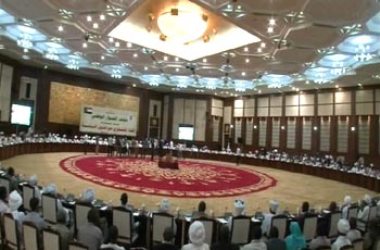Bashir reiterates rejection of Paris Declaration, but welcomes Addis Ababa deal
November 2, 2014 (KHARTOUM) – Sudanese president Omer al-Bashir strongly repeated his rejection of the Paris Declaration signed between the rebel groups and the National Umma Party (NUP), but welcomed the Addis Ababa agreement signed by the same forces and the national dialogue committee.

He further said they have the details of the circumstances under which occurred the signing of the Paris Declaration, adding, “We are responsible for protecting the country and they want to work out a road map against us”.
Bashir went further to say that the rebels chose al-Mahdi because they were seeking for an acceptable “national figure” to chair an interim government.
The Sudanese Revolutionary Front (SRF) and the NUP signed the Paris Declaration on 8 August after preliminary discussions conducted by the party’s vice-president Merriam al-Mahdi with the rebel groups in the French capital.
The deal calls for a comprehensive solution involving all the political forces including rebel groups. It further stresses on the need to create a conducive environment in order to hold a genuine national dialogue.
ADDIS ABABA AGREEMENT
Bashir refuted calls to ensure public freedoms and to release political detainees saying such calls are “nonsense”, adding no political party complained from restriction of its activities.
“Anybody have a complaint has to come and say it inside the committees (of the national dialogue),” he said.
The president said they are ready to militarily confront rebels on the battlefield but also ready for dialogue with those who want negotiations.
He further welcomed the agreement on the national dialogue and constitutional process reached by the national dialogue subcommittee for external relations and the African Union High-Level Implementation Panel (AUHIP) on 4 September.
“We welcome this agreement even if the delegates of the dialogue mechanism, Ghazi Salah Al-Din al-Attabani (Reform Now Movement leader) and Ahmed Saad Omer were not mandated to sign it,” he said.
The same agreement was signed separately on the same day between the AUHIP and the signatories of Paris Declaration.
At the time, the national dialogue delegation, which was in Addis to brief the AUHIP about the signing of a road map for the internal process, refused to sign a joint text with the rebels, stressing they were not mandated to sign such declaration of principles with the SRF and the NUP.
Bashir told the meeting that Chadian president Idris Deby continues his efforts to convince the rebel groups to participate in the national dialogue process and reiterated his call for the holdout political parties and rebel groups to join the process.
However, he said they cannot postpone the national dialogue waiting political forces that did not yet say when they would join it after their preliminary approval of the process.
“But they can join the dialogue at any time,” he said.
The NUP was among the first political forces that joined the dialogue process but suspended its participation after the arrest of its leader Sadiq al-Mahdi in May over statements accusing the government militias of committing crimes in Darfur.
The general assembly of the dialogue authorised the national dialogue high committee, also known as 7 + 7, to determine when the national dialogue will commence.
Bashir said, the kick-off of the internal political process would not exceed the end of November, and should take a period between one to three months. He further indicated that its outcome will form a doable road map.
The meeting approved the mechanism’s performance in the past period, the road map for dialogue reached on 9 August, and Addis Ababa agreement, as well as different reports submitted by several subcommittees.
ELECTION POSTPONEMENT
The general assembly meeting, which was attended by 83 parties, witnessed divergences over the postponement of the general elections scheduled for April 2015.
But the president categorically refused any delay of the electoral process, stressing the need to conclude the dialogue before the end of his term to avoid a constitutional vacuum.
In statements after the meeting, Attabani accused the ruling party of seeking to impose the elections on political parties.
He further expected that the NUP would boycott the process after Bashir’s rejection of the Paris Declaration.
He asked the president to explain what does he means by “red lines”.
He said such statements mean to mislead the political forces, stressing that the ruling party did not provide evidence confirming the existence of a plot to seize power.
The Sudanese government and the rebel Sudan People’s Liberation Movement-North (SPLM-N) are to meet on 12 November in Addis Ababa for talks on a cessation of hostilities agreement. Similar talks are expected to take place soon with D rebel groups.
The African Union plans also to hold an all-parties conference in its premises to discuss a road map for the national dialogue before moving inside the country to start the process.
(ST)
